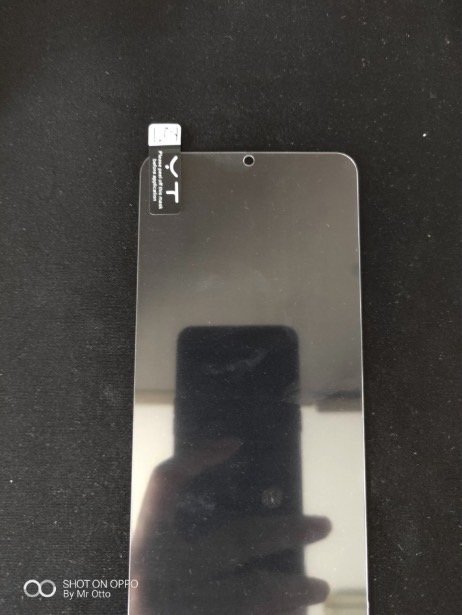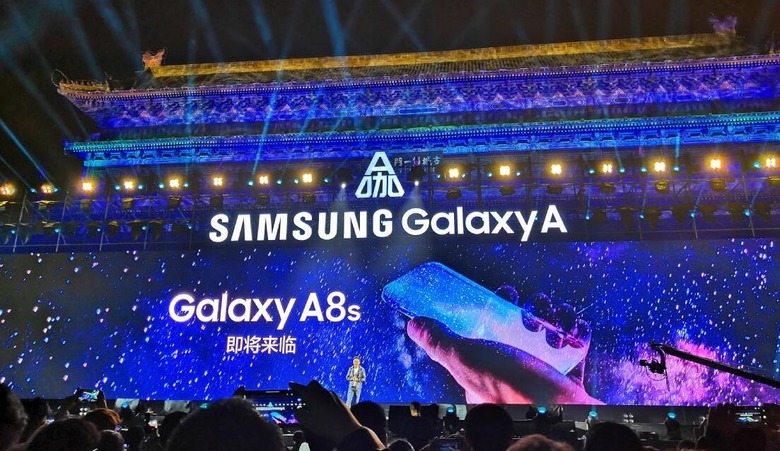New Leak Should Have You Seriously Excited About The Galaxy S10
Samsung a few days ago teased an all-screen, notch-less smartphone design that looked nothing like Samsung has ever created — a phone that seemed to have a camera hole at the top of the screen and no bezels.
We also saw an Apple patent that describes methods of drilling a hole through displays to accommodate other components, like cameras. Then, on Friday, Bloomberg came out with a huge story detailing Samsung's plans for the Galaxy S10 and Galaxy F phones that should have any Samsung fan excited about next year's handsets. And the following leak should have you seriously excited about the Galaxy S10.
2018 was the year of the iPhone X clones, there's no question about it. Virtually everyone other than Samsung decided to include a notch on their flagship phone rather than come up with something new. And let's not act like phones from Sharp and Essential that preceded the iPhone X were the inspiration for the notch. The iPhone still sets the time in the smartphone business, and almost everyone else still follows its lead.
Now that the first wave of clones has arrived, smartphone makers are actually coming up with ways to reduce the size of the notch and increase the overall screen-to-body ratio. The OnePlus 6T, coming next week with a teardrop notch, is one such example. One other way to remove the notch is to use slider mechanisms for the camera like Oppo and Xiaomi did with the Find X and Mi Mix 3, respectively.
Although, let's be serious for a second here: Slider phones are not the way to go. In addition to worrying about the phone's durability, you also lose waterproofing and battery life. Not to mention that you can't really use cases with slider phones. It's a bad idea for making all-screen phones, but at least others are trying not to copy Apple.
Drilling holes into the screen for the selfie cameras and other front-facing elements from the notch may be a more elegant design compromise than the notch, assuming display makers can mass produce enough screens to meet demand. The following image, showing a smartphone screen protector featuring a hole at the top, was posted on Weibo:

If accessory makers are creating such products already, they're doing it with specific devices in mind. In this case, the accessory has probably been created for the Galaxy A8 phone that Samsung teased during an event earlier this week.That means Samsung has perfected tech required for manufacturing such displays. Well, either that or someone is trolling us all with the image above.
From the looks of it, that A8 will be the first Samsung phone to feature this new design. And a similar design may be used by the Galaxy S10 next year as well — from the Bloomberg story:
The standard S10, codenamed "Beyond," features an OLED screen curved on both sides, round-shaped corners and almost no bezel at the top and bottom, the people said. It will be about the same size as the current 5.8-inch S9 model. The S10 has triple cameras on the back while the front camera is visible and tucked under the screen, the people said. Samsung also plans a bigger "plus" version for next year.
Back in September, Samsung revealed a change of strategy when it comes to smartphone innovation. The company said it would debut novel features on mid-range devices, which is exactly what it did. Its first smartphones with three and four rear-facing cameras were launched in a matter of weeks, and both devices were not flagship handsets. So it's not surprising to see Samsung test this screen design with the A8, before porting it over to flagship phones.
The Galaxy S10 is already rumored to get a triple camera on the back, but it'll probably be more powerful than the one found on the Galaxy A7. And the phone's display may be even more noteworthy than the A8's. Older rumors claimed the Galaxy S10 would support 3D facial recognition like Face ID on the iPhone X phones, but if you want Face ID on a phone, you need bigger notches, or multiple holes at the top of the screen.
